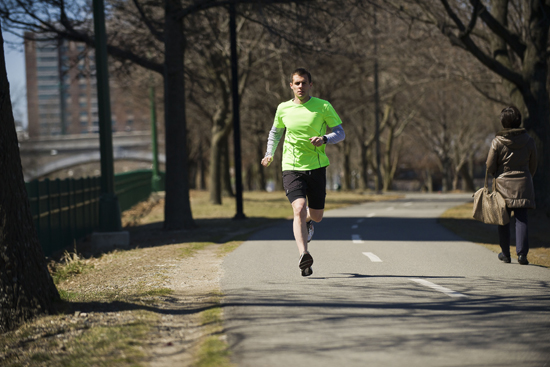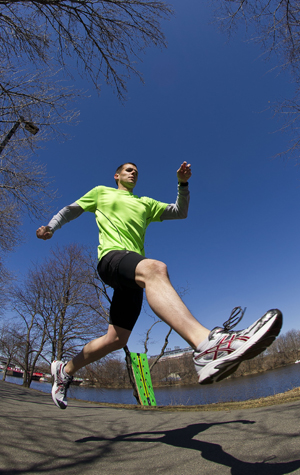Running Boston to Fight Liver Disease
For BU’s Tim Kelly, the Marathon is personal

Tim Kelly is one of 201 members of the Run for Research team, which is raising money to benefit the American Liver Foundation. So far, he has collected close to $6,000. Photos by Kalman Zabarsky
Tim Kelly isn’t running the 117th Boston Marathon for the medal, the cheers, or the runner’s high that compels people to slog 10 miles in a snowstorm during training season. Each stride he takes during Monday’s race is aimed at tackling liver disease, which affects 30 million people in this country, including him.
The first-time marathon runner and BU assistant director of admissions has lived with two liver conditions since high school. Kelly (CAS’09, SED’11) is one of 201 members of the Run for Research team, which is raising money to benefit the American Liver Foundation, an organization that promotes education, prevention, cure, and support of liver diseases. So far, he has collected close to $6,000.
While Kelly’s health issues don’t affect him on a day-to-day basis, he knows others with similar conditions aren’t so fortunate. “Running with this team has made me realize how liver diseases affect such a wide range of people,” he says. “I’ve met a seven-year-old child who has had two liver transplants and adults who have recovered from rare liver diseases. I’ve thought about how running will benefit me from a personal perspective, but this team has a greater purpose.”
The Lexington, Mass., native ran track and cross-country in high school. He grew up watching the annual Boston Marathon extravaganza, and this year he finally decided to join the approximately 26,000 runners tackling the 26.2-mile course, which begins in Hopkinton, Mass., and ends in Copley Square. His decision to run for ALF, he says, was a no-brainer once he thought about the uncertainty he had to cope with when he was diagnosed in high school with primary sclerosing cholangitis and autoimmune hepatitis, two relatively rare immune-related conditions.
“High school is a scary enough time as it is—you’re trying to find your identity and there is a lot of pressure,” Kelly says. “Learning about my liver conditions was not only stressful for me, but also for the people around me. There is enough stress on the average teen, and added to that is the anxiety about what was going to happen.”
A poorly functioning liver is more serious that most people realize, he says, because the organ performs hundreds of critical functions. According to the ALF, there are millions of Americans who aren’t even aware that they have liver disease. That ignorance may be the reason liver disease is one of the top 10 causes of death in this country, even though many forms of liver disease are preventable and many more can be treated if detected early. Despite the millions of people affected by it, liver disease doesn’t receive the same amount of media attention as cancer and Alzheimer’s disease, Kelly says, and diseases of the liver carry a stigma that other diseases don’t have.

“A lot of people assume that people with a liver disorder had a drinking or drug problem,” he says, “but that’s not true. ALF’s education and outreach efforts can hopefully show people that liver disease can affect anyone.”
Preparing for his first marathon, Kelly says, he was surprised by the team aspect of training. He had always thought of running as a solitary sport. He enjoys the team’s community spirit, as well as the strategic training schedule set by their coach, a veteran marathon runner.
“The last big run we did was 21 miles,” he says. “At the peak I was running 50 miles a week, and now we’ve tapered down.”
He continued to train even when he was traveling for his job with admissions. He recruits for BU in upstate New York, so he often found himself using Google Maps or asking a local guidance counselor to recommend a route. He counts himself lucky that he could see beautiful state parks and get a change of scenery from Boston’s paved roads.
Kelly isn’t sure if Monday will be the start of a long marathon career, but he does know that he wants to stay involved with the ALF. “I’m optimistic that the work, and the fundraising our team has done will undoubtedly lead to future medical treatments and impact actual people,” he says.
And when he crosses the finish line? Kelly says he plans to eat a big dinner with his family, maybe at the Shake Shack that recently opened a mile from his home in Newton Centre.
Interested in supporting Tim Kelly in his quest to raise funds for the American Liver Foundation? Donate here.
The Boston Marathon is Monday, April 15, beginning at 9 a.m. in Hopkinton, Mass. The prime viewing location is along Beacon Street, from East Campus through Brookline. The first runners should hit that area sometime after 11:30 a.m. Check out this online map to track how the marathon will progress.

Comments & Discussion
Boston University moderates comments to facilitate an informed, substantive, civil conversation. Abusive, profane, self-promotional, misleading, incoherent or off-topic comments will be rejected. Moderators are staffed during regular business hours (EST) and can only accept comments written in English. Statistics or facts must include a citation or a link to the citation.